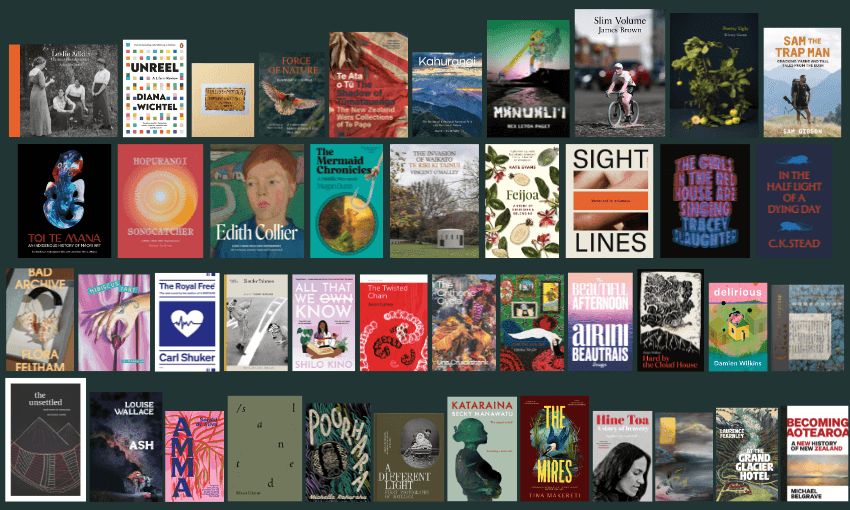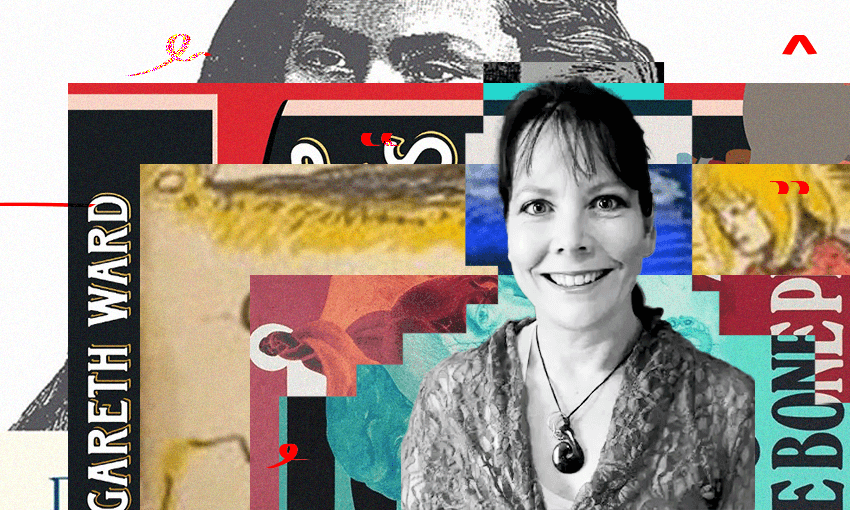The longlist has landed – here are all the books contending for the year’s big literary prizes.
This year 43 books have made the longlist for the Ockham New Zealand Book Awards, whittled down from 175 entries. Here they all are, with analysis from books editor Claire Mabey and poetry editor Hera Lindsay Bird. An asterisk means the book is a debut and therefore up for Mātātuhi Foundation Best First Book Award (worth $3000 each).
Shortlists will be announced on March 5, and winners (including the four best first book award recipients) will be revealed at a ceremony at the Auckland Writers Festival on May 14.
The Jann Medlicott Acorn Prize for Fiction ($65,000 prize)
All That We Know by Shilo Kino (Ngāpuhi, Ngāti Maniapoto) (Moa Press)
Amma by Saraid de Silva (Moa Press)*
Ash by Louise Wallace (Te Herenga Waka University Press)
At the Grand Glacier Hotel by Laurence Fearnley (Penguin, Penguin Random House)
Delirious by Damien Wilkins (Te Herenga Waka University Press)
Kataraina by Becky Manawatu (Ngāi Tahu, Ngāti Māmoe, Waitaha) (Mākaro Press)
Poorhara by Michelle Rahurahu (Ngāti Rahurahu, Ngāti Tahu–Ngāti Whaoa) (Te Herenga Waka
University Press)*
Pretty Ugly by Kirsty Gunn (Otago University Press)
The Mires by Tina Makereti (Te Ātiawa, Ngāti Tūwharetoa, Ngāti Rangatahi-Matakore, Pākehā)
(Ultimo Press)
The Royal Free by Carl Shuker (Te Herenga Waka University Press)
Yes, good. What a stellar bunch! Suspect Spinoff readers are going to fist-pump this list, too, given overall favourites from our end-of-year survey are all here: Amma, All That We Know, Delirious, The Mires, Kataraina and Ash.
Let’s dwell on Ash for a mo, given I called it the best book of the year in 2024 before I’d even read Delirious or The Royal Free which came out months later (I loved them both too). Louise Wallace’s debut novel had me gripped from the first word to the last. I laughed, I cried, I channeled rage and relished the irony. The beauty of this short novel is that not a single word, or space, is wasted: Wallace uses ingenious poetic tools to convey the inner world of her vet-mother-woman character. Ash is inventive and artistic while remaining almost painfully relatable. Happily, Ash remains my favourite novel of 2024 and I’ll be rooting for it all the way to the ceremony in May.
Louise Wallace is in stonking company though: and one must feel for the judges who surely are going to have a hell of a time shedding novels to get a shortlist of four. Laurence Fearnley’s reliably beautiful prose and deep character-development is there; Tina Makereti’s stunning novel, The Mires, and all it says about community, danger and the land we stand upon; Michelle Rahurahu’s accomplished debut (rave-reviewed on The Spinoff by Sam Brooks); Becky Manawatu’s shifting, moving sequel to previous winner, Auē (reviewed on The Spinoff, here).
Saraid De Silva’s debut, Amma, was a bestseller across the country and cemented her reputation as a writer to watch. Likewise, Shilo Kino’s second novel All That We Know made waves. Kirsty Gunn’s spiky, unsettling short story collection, Pretty Ugly (published by Otago University Press, who announced they’ll be publishing one short story collection a year from now on) was reviewed well (on Kete Books, and the NZ Review of Books) and has a shot at carrying the short story flag into the shortlist.
While this list is so strong it really could be anyone’s, I am going to predict that the final four will be weighted towards novels published by Te Herenga Waka University Press, who regularly put out some of the best fiction in the country. For me, Delirious by Damien Wilkins (Gabi Lardies and I co-reviewed and cried over it) and The Royal Free by Carl Shuker are too hard to pass over. Wilkins’ experience and control in handling painful life events is extremely successful storytelling; Shuker’s electrifying, energetic story of a widower in a claustrophobic office and a claustrophobic London with a little, vulnerable baby is superb (note: not everyone thinks like me as is revealed in this co-review). I also think Amma by Saraid de Silva will be very hard to pass over and will be a well-deserved nod to the impeccable and hard work Moa Press are doing to make more space for Aotearoa fiction. Can’t wait to find out if I’m wildly off, or on the money, come March.
The Mary and Peter Biggs Award for Poetry ($12,000 prize)
Fox Spirit on a Distant Cloud by Lee Murray (The Cuba Press)
Hibiscus Tart by Carin Smeaton (Titus Books)
Hopurangi – Songcatcher: Poems from the Maramataka by Robert Sullivan (Ngāpuhi, Kāi Tahu)
(Auckland University Press)
In the Half Light of a Dying Day by C.K. Stead (Auckland University Press)
Liar, Liar, Lick, Spit by Emma Neale (Otago University Press)
Manuali ʻi by Rex Letoa Paget (Saufoʻi Press)*
/Slanted by Alison Glenny (Compound Press)
Slender Volumes by Richard von Sturmer (Spoor Books)
Slim Volume by James Brown (Te Herenga Waka University Press)
The Girls in the Red House are Singing by Tracey Slaughter (Te Herenga Waka University Press)
Hera Lindsay Bird, Poetry editor: The poetry longlist is always so long compared to the number of total eligible books, that it feels almost like an exercise in exclusion, like inviting 15 of the 20 kids in your class to your birthday party. Some years it’s easier to commiserate about the omissions than it is to celebrate the many worthy nominees. We’ve got two skinny legends – Slender Volumes by Richard Von Sturmer and Slim Volume by James Brown. We have Tracey Slaughter’s deliciously Lynchian The Girls in the Red House are Singing and Carin Smeaton’s exquisite Hibiscus Tart. Some of the books breathe new life into the past – Lee Murray’s Fox Spirit on a Distant Cloud tackles hidden stories of women in the Chinese diaspora. /Slanted by Alison Glenny takes on an Edwardian mountaineer named Freda, and C.K. Stead reprising his Catullus-inspired poetic series in In the Half Light of a Dying Day. Emma Neale digs for the truth in Liar, Liar, Lick, Spit. There’s only one debut author in the list, Rex Letoa Paget, the author of Manuali ʻi – a book overflowing with sweetness and self-discovery.
Some of the notable omissions include Plastic by Stacey Teague, of my favourite poetry books of last year, which thrills the heart with its luxurious simplicity and understated beauty. Also disappointingly absent from the shortest is Tarot by Jake Arthur, Killer Rack by Sylvan Spring and Majella Cullinane’s Meantime, which Vincent O’Sullivan described as “the finest and most moving new collection that I have read for a long time.” There are likely a few “notable omissions” from the “notable omissions” list, but that’s because it’s a real pain in the ass to try and figure out every book of NZ poetry published in the last year. Congratulations to the shortlisted. Commiserations to those who didn’t make the list. True poets know that institutional gratification is ultimately meaningless, and true success can only be found in the withholding gaze of the distant and unforgiving moon.
The BookHub Award for Illustrated Nonfiction ($12,000 prize)
A Different Light: First Photographs of Aotearoa by Catherine Hammond and Shaun Higgins (Auckland University Press)
Edith Collier: Early New Zealand Modernist by Jill Trevelyan, Jennifer Taylor and Greg Donson (Massey University Press)
Fenoga Tāoga Niue I Aotearoa: Niue Heritage Journey in Aotearoa by Molima Molly Pihigia, Toluma’anave Barbara Makuati-Afitu, Kolokesa Uafā Māhina-Tuai, Hikule’o Fe’aomoeako Melaia Māhina and Janson Chau (Mafola Press)
Force of Nature Te Aumangea o Te Ao Tūroa: A Conservation History of Forest & Bird 1923-2023 by David Young and Naomi Arnold (Potton & Burton)
Golden Enterprise: New Zealand Chinese Merchants 1860s-1970s by Phoebe H. Li (Chinese Poll Tax Heritage Trust)
Leslie Adkin: Farmer Photographer by Athol McCredie (Te Papa Press)
Sam the Trap Man: Cracking Yarns and Tall Tales from the Bush by Sam Gibson (Allen & Unwin New Zealand)*
Sight Lines: Women and Art in Aotearoa by Kirsty Baker (Auckland University Press)*
Te Ata o Tū The Shadow of Tūmatauenga: The New Zealand Wars Collections of Te Papa by Matiu Baker (Ngāti Toa Rangatira, Te Āti Awa, Ngāti Raukawa, Ngāti Whakaue), Katie Cooper, Michael Fitzgerald and Rebecca Rice (Te Papa Press)
Toi Te Mana: An Indigenous History of Māori Art by Deidre Brown (Ngāpuhi, Ngāti Kahu) and Ngarino Ellis (Ngāpuhi, Ngāti Porou) with Jonathan Mane-Wheoki (Ngāpuhi, Te Aupōuri, Ngāti Kurī) (Auckland University Press)
This is the category where all the beautiful books hang out: the hardbacks with full-page photography and glorious visual storytelling and design. This year there are landmark publications in the field of art history, with Toi Te Mana, Sight Lines, and Fenoga Tāonga Niue I Aotearoa each progressing the field. There are nature tomes, and photography books that serve up such vivid visions of the past they’ll make your skin prickle.
Every year Te Papa Press has at least one beaut: this year they have two. Leslie Adkin: Farmer Photographer by Athol McCredie, and Te Ata o Tū The Shadow of Tūmatauenga: The New Zealand Wars Collections of Te Papa. I adored McCredie’s book: the photographs are otherworldy portals (see inside here). But Te Ata o Tū is sweeping, handsome (see inside here) – it takes artefacts from Te Papa’s collections to journey through the New Zealand Wars. It’s a brilliant way to educate, and see.
Potton & Burton also always have a title in the mix. I thought it was going to be Kahurangi by Dave Hansford but instead it’s Force of Nature Te Aumangea o Te Ao Tūroa: A Conservation History of Forest & Bird 1923-2023 by David Young and Naomi Arnold, a magnificent reminder of the nature-saving work done by Forest & Bird for over a century now. (Also, see below for Kahurangi!).
Auckland University Press have three books in the list (the most of all the publishers): two extraordinary art history tomes – Toi Te Mana and Sight Lines, both of which took years to put together and are now landmark publications. And A Different Light: First Photographs of Aotearoa by Catherine Hammond and Shaun Higgins which is fascinating and kind of spooky: those sepia-toned photographs where the whites of the eyes gleam in a hyper-alive way.
I’m yet to lay eyes upon Fenoga Tāoga Niue I Aotearoa but know it was produced to commemorate and accompany an exhibition that traced the 30-year journey of Ōtāhuhu based Falepipi he Mafola Niuean Handcraft Group Inc. (Falepipi he Mafola Group). It’s 500 pages, bilingual (Niuean and English), and includes commentary from 45 people. Sounds mammoth and amazing.
The General Nonfiction Award ($12,000 prize)
Bad Archive by Flora Feltham (Te Herenga Waka University Press)*
Becoming Aotearoa: A New History of New Zealand by Michael Belgrave (Massey University Press)
Feijoa: A Story of Obsession & Belonging by Kate Evans (Moa Press)*
Hard by the Cloud House by Peter Walker (Massey University Press)
Hine Toa: A Story of Bravery by Ngāhuia Te Awekōtuku (Te Arawa, Tūhoe, Ngāpuhi, Waikato)
(HarperCollins Publishers Aotearoa New Zealand)
Kahurangi: The Nature of Kahurangi National Park and Northwest Nelson by Dave Hansford (Potton & Burton)
The Beautiful Afternoon by Airini Beautrais (Te Herenga Waka University Press)
The Chthonic Cycle by Una Cruickshank (Te Herenga Waka University Press)*
The Invasion of Waikato Te Riri ki Tainui by Vincent O’Malley (Bridget Williams Books)
The Mermaid Chronicles: A Midlife Mer-moir by Megan Dunn (Penguin, Penguin Random House)
The Twisted Chain by Jason Gurney (Ngāpuhi) (Otago University Press)*
The Unsettled: Small Stories of Colonisation by Richard Shaw (Massey University Press)
Unreel: A Life in Review by Diana Wichtel (Penguin, Penguin Random House)
Before you start throwing things at your computer screen, please note that Whaea Blue by Talia Marshall wasn’t entered into the awards. The Spinoff understands that this was the author’s decision and her publishers (THWUP) are fully supportive of her choice.
But, you could throw things at the fact that we’re missing: Harry Ricketts’ memoir, First Things; Lynn Davidson’s memoir, Do You Still Have Time For Chaos?; and Maddie Ballard’s gorgeous memoir, Bound. Even with the extra long list of 13 books (“a discretionary allowance that reflects the greater number of entries and range of genres in this category”) it’s irksome that these three outstanding memoirs missed out.
Correct procedure that Megan Dunn’s The Mermaid Chronicles is here – a standout book for me in 2024. Nobody writes like Dunn. Searching, raw, funny, painful – a book about motherhood, and art, and trying to hold onto the slippery nature of “being an artist” in a world of capitalism and climate change and all the shit that gets in the way, but is that shit actually part of the grander project? Such a book from a singular writer.
Crowd faves The Chthonic Cycle by Una Cruickshank and Bad Archive by Flora Feltham are deservedly here: both idiosyncratic, exploratory essay collections that showcase the taste and expertise of their publisher, Te Herenga Waka University Press, who seem to nab the most exciting of new voices.
This category is so weird. I never know whether the weight will fall on the side of the personal, creative nonfic (like Te Awekōtuku’s brilliant memoir; like Beautrais’ collection of personal essays) or the educational (like Belgrave’s massive, and truly excellent, Becoming Aotearoa; or Kate Evans’ expansive book on the Feijoa; or Richard Shaw’s timely, useful stories of Pākehā unpacking their own histories of colonising Aotearoa).
My stab at the shortlist would have to include The Mermaid Chronicles, and Hard by the Cloud House (both exploratory, well-researched, taking us to places we’ve never been before in quite this way). And it would have to include Becoming Aotearoa for the sheer excellence in handling large volumes of history in such an accessible way. For the final spot? Glad I’m not judging.
So, there you go. Place your bets. Buy some damn books! See you back in March for the shortlists.
Thoughts and prayers to the judges:
The Jann Medlicott Acorn Prize for Fiction is judged by novelist, short story writer and creative writing lecturer Thom Conroy (convenor); bookshop owner and reviewer Carole Beu; and author, educator and writing mentor Tania Roxborogh (Ngāti Porou). They will be joined in deciding the ultimate winner from their shortlist of four by an international judge.
The judges of the Mary and Peter Biggs Award for Poetry are poet, critic and writer David Eggleton (convenor); poet, novelist and short story writer Elizabeth Smither MNZM; and writer and editor Jordan Tricklebank (Ngāti Maniapoto, Ngāti Mahuta).
The General Nonfiction Award is judged by author, writer and facilitator Holly Walker (convenor); author, editor and historical researcher Ross Calman (Ngāti Toa, Ngāti Raukawa, Ngāi Tahu); and communications professional, writer and editor Gilbert Wong. The BookHub Award for Illustrated Nonfiction is judged by former Alexander Turnbull chief librarian and author Chris Szekely (convenor); arts advocate Jessica Palalagi; and historian and social history curator Kirstie Ross.




